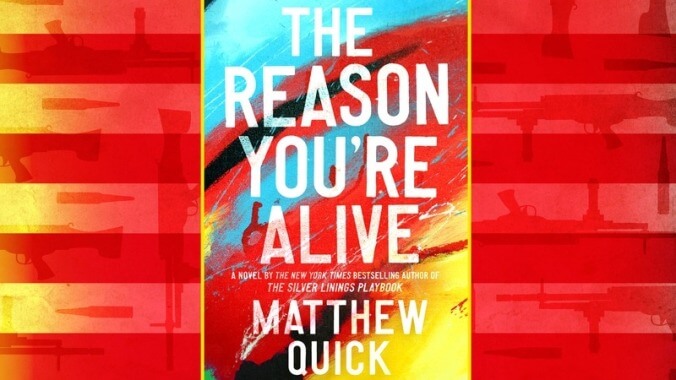Dysfunctional families are Matthew Quick’s specialty, and the latest novel from the author of The Silver Linings Playbook doesn’t deviate from that focus. The Reason You’re Alive deals with the impact of PTSD, depression, and adultery on a Philadelphia family, but also zooms in on the especially sharp divides created by America’s culture wars. Quick forces both readers and characters to reexamine their first impressions through his narrator, David Granger, a self-described “American patriot” who manages to be both likable and sympathetic in spite of his constant rhetoric about “the great Jihad,” “bullshit global warming theories,” and other right-wing favorite subjects.
The story opens with the 68-year-old David in a hospital after having a car accident caused by a brain tumor. His estranged, liberal son Hank is compelled to attempt reconciliation by his dad’s health and his own marital troubles. That process reveals how little Hank knows about his father, from the wrongs he committed during the Vietnam War to his surprisingly diverse friend group.
David doesn’t fear his own mortality, convinced that death comes only to those who have “bought the bullet” and given up on life. But the tumor—which he blames on exposure to Agent Orange—leads him on a journey to make peace with the past and improve his future. While the book is overall light and sometimes laugh-out-loud funny, it shifts tone quickly between a rom-com-style plot where David tries to set Hank up with Sue—the adopted Vietnamese daughter of a fellow veteran, because he hates Hank’s Dutch wife—to David’s survivor’s guilt of managing a relatively normal life when so many of his fellow soldiers couldn’t.
The traumas of war and America’s treatment of its veterans are an ongoing theme—it’s no coincidence the book is being released on July 4—with David stuck in the frustrating position of sheltering his son from the worst of his wartime dealings while also feeling unappreciated for his service. Several of David’s veteran friends have found closure in their own ways, and The Reason You’re Alive is fundamentally about the power to forgive both yourself and others. Much of David’s life, both the good and bad parts, have been dominated by guilt, fear, and an inability to relate well to those who don’t understand those parts of himself.
In classic Quick fashion, the novel is full of intriguing supporting characters. But at only 240 pages, the book leaves most of them largely unexplored. That’s fine in some cases where it’s clear that David is just getting a glimpse into their lives, but it makes too many of the book’s conflicts feel glossed over. Hank’s wife’s infidelity moves the plot forward and fuels a colorful rant about women—what they want and the warning signs he should have seen—but the reasons for it and the reconciliation that follows are never adequately explained. That shortcoming is particularly sharp when contrasted with Quick’s more developed characters like the gun-loving Sue, who’s become David’s surrogate daughter, and David’s artist wife and her struggles with motherhood and depression.
The Reason You’re Alive too often feels divided into how David sees himself and how Hank sees him. It would have been nice to really get the perspective of one of David’s friends about how they were able to see through his often stereotypical rhetoric to get to like and respect the good man underneath. David calls Sue “genetically Vietnamese” to distinguish her as a good American as opposed to the Vietnamese people he fought in the war; he refers to his spin instructor as “Gay Timmy” and opines on the stamina required to get through a “gay dinner party.” The point is that the genuine friendships David has shows that his tolerance should be judged by his actions not words, in contrast to Hank’s political correctness that David judges to be just for show. But the result is that David feels idealized even for all his flaws.
The Reason You’re Alive has already been optioned as a movie, and its mix of breezy humor and poignant reveals is perfect for the big screen. It’s not likely to solve too many family feuds, but there is merit in its message that people are rarely entirely as they seem.
Purchase The Reason You’re Alive
here, which helps support The A.V. Club
.

 Keep scrolling for more great stories.
Keep scrolling for more great stories.
